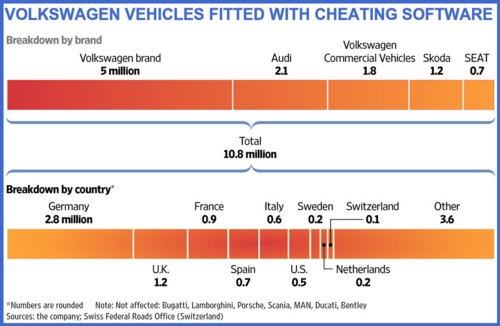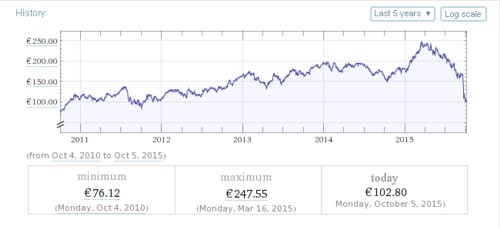VEHICLES FITTED WITH VOLKSWAGEN EA 189 DIESEL ENGINE
The Volkswagen emissions scandal, nicknamed "Dieselgate" is a controversy of global proportions, perpetrated by the largest carmaker in the world. And unless you've lived under a rock for the past three weeks, you would have heard it spoken about at breakfast diners, discussed in public transport on the way to work, lamented over by colleagues who recently bought a VAG vehicle, commented on at social gatherings and scandalized by the facebook and twitter communities. To date Volkswagen AG admitted that 11 million vehicles manufactured between 2009 and 2015, fitted with EA189 diesel engine are affected with "cheating software". Global pressure is forcing Volkswagen to recall all affected vehicles to remedy the problem by the end of 2016. Currently all the affected models have been withdrawn from sale and includs the 2009-2015 range of VW Beetle 2.0L TDI, VW Golf 2.0L TDI, VW Jetta 2.0L TDI, Audi A3 2.0L TDI, and VW Passat 2.0L TDI sedan and wagon, Audi A4 sedan and wagon, Audi A5 coupe, Audi Q5 2.0 TDI SUV, VW Tiguan SUV, the Skoda Yeti SUV and Skoda Superb sedan and wagon, all fitted with the controversial 2.0-litre EA189 TDIengine. However, the cars are safe to drive since they don't have safety issues. These vehicles are globally distributed as per the graphic below. As can be seen approximately half a million (482,000 ) of these suspect vehicles were sold in the USA and is also the place from where all the hoo-haa, objections, opposition, protest, criticism and law suites originated thus far, even though the USA reneged from the Kyoto protocol as long ago as 2001 whilst under the Bush administration.
Meanwhile, Peter Mock the managing director of a European non-profit clean-air organisation found discrepancies in the European tests on VW Passat, and VW Jetta diesel vehicles. His organisation was unsuccessful at convincing European regulators to emulate the higher and stricter U.S emissions standards for diesel automobiles. He then appealed to John German his American counterpart at the International Council on Clean Transportation to replicate the tests in the U.S., convinced that they could show Europeans it was possible for diesel cars to run clean. So in conjunction with the West Virginia University’s Center for Alternative Fuels, Engines and Emissions (CAFEE) -- contracted to the EPA-- they found emissions discrepancies between lab tests and road tests of Volkswagen Diesel vehicles fitted with the EA 189 Diesel engine.
 |
| Whistle blowers - John German (L) and Peter Mock (R) |
After making their findings known to the EPA, an investigation was opened against Volkswagen in May of 2014. The string of subsequent events just snow balled, resulting in the forced resignation of Prof. Dr Martin Winterkorn CEO at Wolfsburg Germany. Termination of Ulrich Hackenberg, engineer and former head of R&D at Audi and Wolfgang Hatz engineer and former head of R&D Porsche. Admission that Volkswagen cheated at emission testing and subsequent loss of 30 billion Euro market share in just two days of trading. Congressional hearings grilling of Michael Horn, the CEO of VW's American division.
Volkswagen is the largest automobile manufacturer in the world with a global employee figure of almost 600,000 people. Fines leveled at Volkswagen popping up all over the world could result in sequestration and add all these people to that already long unemployment line. But according to the new CEO Matthias Mueller while addressing more than 20 000 employees, he assured them Volkswagen will rise above the scandal. According to Michael Horn when questioned by the House of Representatives' Energy and Commerce Committee, he said that the "cheating software" was not a corporate decision but that of a group of rogue German software engineers.











